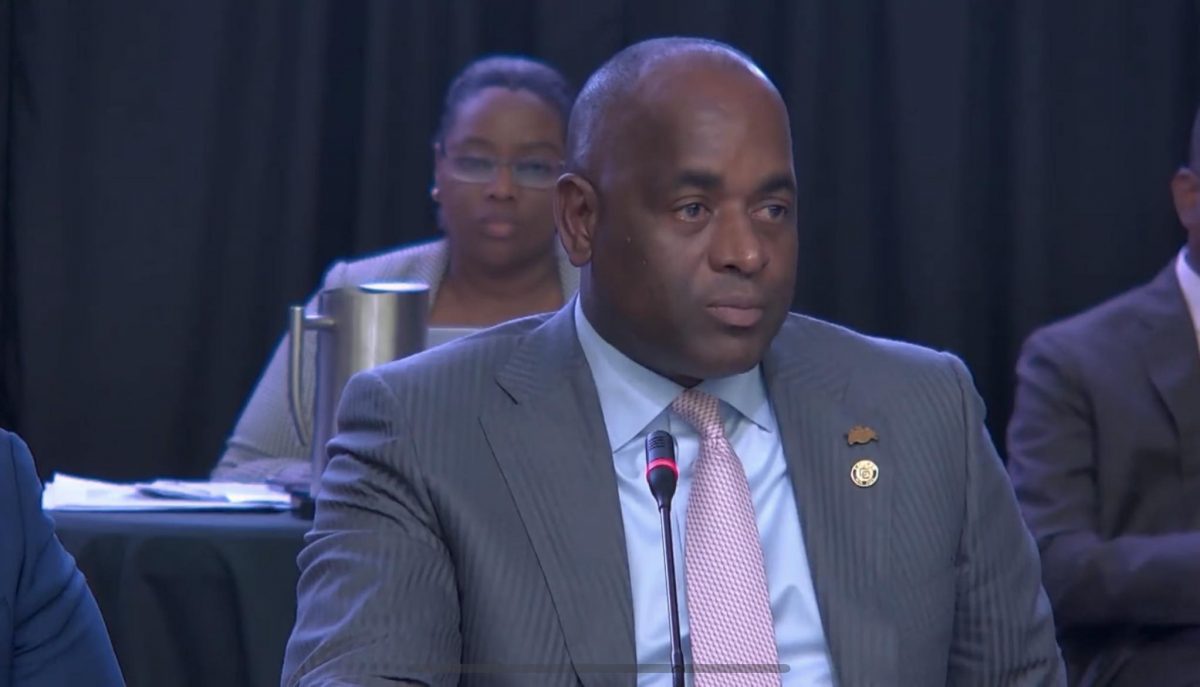CARICOM Heads of Government have resolved to remove impediments to free movement across the region by March next year, according to CARICOM Chairman, Roosevelt Skerrit. He acknowledged that the decision cannot be implemented immediately as modalities in the Revised Treaty of Chaguaramas will have to be dealt with by a legal team.
“We have taken a decision to have the free movement of all categories of people to live and work…We believe that this is a fundamental part of the integration architecture and at 50 (years), we could not leave Trinidad and Tobago and not speak about the core of the integration movement and that is people’s ability to move freely within the Caribbean Community,” Skerrit said as he noted that this was the highlight of their three-day long meeting in Trinidad and Tobago.
Speaking at the closing press conference for the 45th CARICOM Heads of Government Meeting yesterday, the Dominican Prime Minister explained that this decision will allow people to access primary and equal health care and educational opportunities. The lifting of restrictions on free travel will also pave the way for better security and hassle-free travel.
Skerrit added further that with this decision, they have served the community and given the people of the region what they need. “We hope to have it implemented by the 30th of March 2024. This is great news and I think of the discussion and the number of decisions we have taken this is ‘de decision’ we have taken at this conference. I believe our founding fathers are smiling down from heaven because we have arrived at this decision,” he said to applause from those present.
Meanwhile, Barbadian Prime Minister Mia Mottley confirmed at the press conference that the decision was made to move from the freedom of movement of skills and service to free movement of people.
“It’s all people, there’s no services anymore… This now gives full expression to what every Caribbean people have wanted since we had control of our destinies,” Mottley said.
She explained the amendments must be able to guarantee a minimum set of rights for citizens and do not open up countries to possible liabilities. Once these rights are established and agreed upon, she stated, they will form part of the amendments to the treaty.
“Out of an abundance of caution and being sure-footed, there are some aspects in the treaty that require amendment and therefore we are giving ourselves until the 30th of March 2024 to make the amendments,” she informed.
According to Mottley, they will soon look at accessing funds from the CARICOM Development Fund to finance mechanisms that will upgrade facilities in each country. This, she noted, is to ensure that citizens are able to benefit from an equal and accessible level of service from the different countries in CARICOM.
The Barbadian Prime Minister related that Haiti’s Prime Minister, Ariel Henry, has requested his country be excluded from the agreement given its current circumstances. Haitians nationals, it was related, will be subjected to visa restrictions despite Haiti being a signatory to CARICOM.
“…The Prime Minister of Haiti asked that the arrangements we have put in place for freedom of movement, that Haiti be excused from those arrangements, a derogation and we have agreed because Haiti’s circumstances are obviously different at this point… the status quo remains for those countries who require visas for Haitians travelling.”
Mottley also stated that the free movement agenda does not apply to The Bahamas and Montserrat as they are not signatories to the CARICOM Single Market and Economy treaty.
Additionally, Skerrit disclosed that at the CARICOM leaders’ retreat in Dominica next month, August 18- 19, they will spend time reviewing ways in which they can foster functional cooperation, hassle-free travel for citizens, and regional governance that will bring tangible benefits to citizens.
“These are the things which matter to the average person in the streets of the Caribbean Community- that they can see tangible benefits,” he said about the commitment.
The CSME, which forms part of the Revised Treaty of Chaguaramas, was designed to implement provisions for the removal of trade and professional restrictions.
The Single Market space was established to facilitate the free movement of skilled professionals in the various fields of services, capital, technology, university graduates, media workers, artistes, musicians, sportspersons, nurses and teachers among, others.





